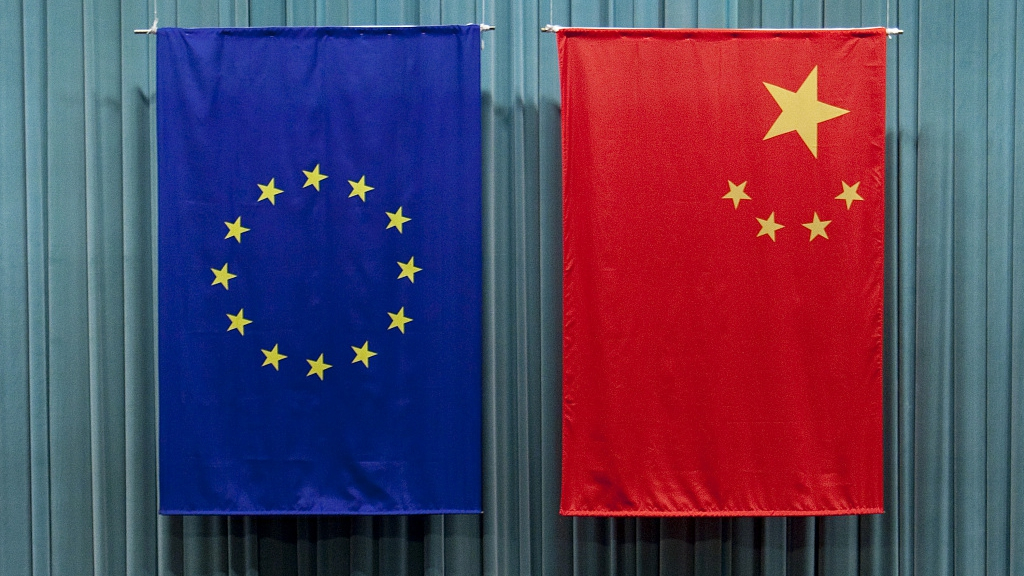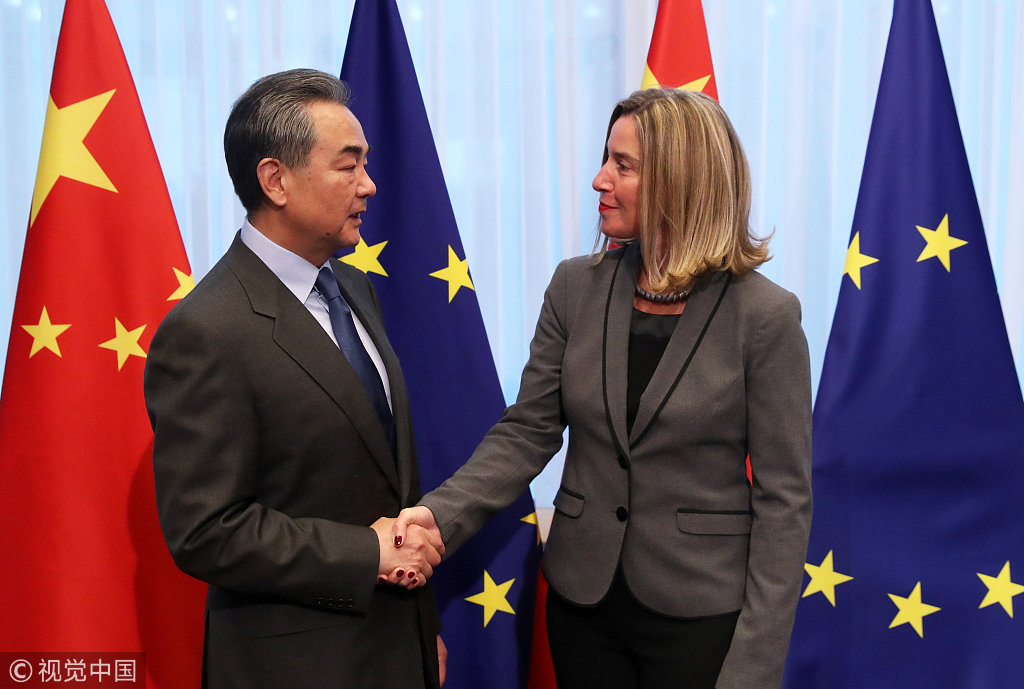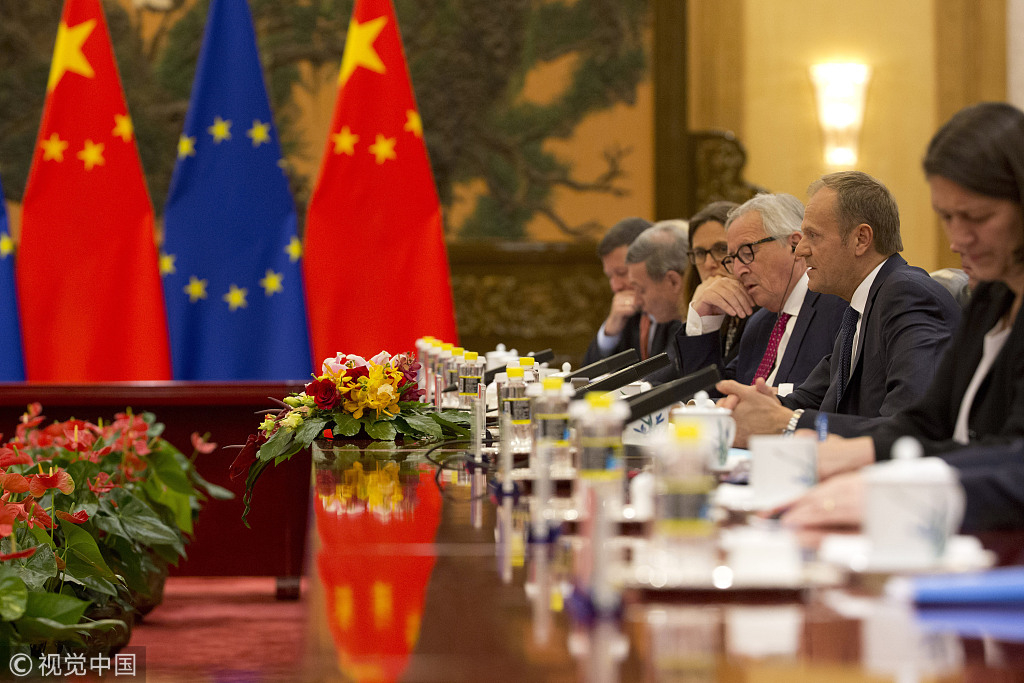
Opinion
18:44, 18-Mar-2019
The EU needs to remain calm and objective about China
David Lee

Editor's Note: David Lee is a consultant and author based in Beijing who works on cross-cutting themes of energy, health, international politics and international development. The article reflects the author's opinion, and not necessarily the views of CGTN.
Chinese President Xi Jinping will embark on a new European trip from March 21 to 26 that also marks the first overseas visit of the Chinese leader in 2019.
Five years after Xi's landmark visit to the European Union Headquarters in Brussels, the European Commission and the High Representative of the Union for Foreign Affairs and Security Policy released, on March 12, a joint communication to propose ten action points for dealing with China relations.
The ten-point action plan would then be submitted to the European Council later this month for approval. When implemented, the action plan is expected to maintain China policy unity within the European Union in the years to come.
The ten actions proposed cover both overall EU-China relations and specific topics, including climate change, the Iranian nuclear deal and cybersecurity. The wide range of the actions proposed correctly reflects the width of the bilateral relations between two of the world's three biggest economies.
Interestingly, reading through these ten action points, one would discover that at least half of them are the EU's internal work, instead of external engagement with its second biggest trading partner. EU unity of action is in focus for procurement standards, digital infrastructure security and foreign investment policy, among others.
The European Council has been called on to make key political decisions on these internal matters to provide the EU with a stronger footing for China engagement. Therefore, the EU's strategic look at China relations is as much a foreign policy exercise as introspection about its own global competitive posture as relates to its internal unity.

Chinese Foreign Minister Wang Yi (L) is welcomed by EU High Representative for Foreign Affairs and Security Policy Federica Mogherini ahead of a meeting in Brussels, Belgium, March 18, 2019. /VCG Photo
Chinese Foreign Minister Wang Yi (L) is welcomed by EU High Representative for Foreign Affairs and Security Policy Federica Mogherini ahead of a meeting in Brussels, Belgium, March 18, 2019. /VCG Photo
This EU introspection as it continues to engage with China has been made even more conspicuous given recent developments when Italy, the third largest economy in Europe, apparently broke rank with European colleagues by announcing it would join China's Belt and Road Initiative (BRI).
This big announcement would then be followed by a suggestion that Malta, a Mediterranean island nation keen for foreign investment, would also embrace the BRI.
It seems to me that the EU's introspection, as reflected by the action points for unity of action among member countries, is closely related to its evolving view of China.
In open frankness, the joint communication presents the EU's China profiling: no longer a developing country, but a key global actor and leading technological power, a cooperation partner, an economic competitor, and a “systemic rival” promoting alternative models of governance.
While I appreciate this EU candidness, I'd remind how China views Europe. As of today, China has released three policy papers on EU engagement, the latest last December. According to the policy papers, China has always appreciated the cause of European integration, even against the backdrop of Brexit and rising nationalistic movements in individual European countries.
As a developing country dedicated to global peace and development, China remains committed to working with European colleagues towards world multi-polarity and economic globalization, as it is the Chinese belief that both China and EU are major contributors to these two key global developments.
Indeed, there are differences in how the EU and China view each other. If the tremendous process of China rising in is any cause for EU's introspective exercise, I'd hope the Europeans remain calm and objective during its assessment.

European Council President Donald Tusk, (2nd R) and European Commission President Jean-Claude Juncker (3rd R) meet Chinese Premier Li Keqiang (not pictured) at the Great Hall of the People in Beijing, China, July 16, 2018. /VCG Photo
European Council President Donald Tusk, (2nd R) and European Commission President Jean-Claude Juncker (3rd R) meet Chinese Premier Li Keqiang (not pictured) at the Great Hall of the People in Beijing, China, July 16, 2018. /VCG Photo
Firstly, EU's use of the term “rival,” though an indication of frank honesty, never helps with constructive cooperation between partners. Despite the robust economic, trade, and cultural links between Europe and China, the EU's ideologically-driven label on reforming and rising China curtails bilateral relations that could otherwise grow even stronger.
Besides, thinking along the line of ideological rivalry on both ends of the Eurasian continent, EU introspection only aggravates its internal coordination problems. While some EU members are keener to embrace the China Opportunity, others are apparently holding back.
Indeed, China would welcome EU introspection to produce concrete actions that dispel clouds over major investment, infrastructure, and technological projects. The rhetoric of a rising China challenging European democratic governance institutions as a menacing rival has long poisoned the business atmosphere in Europe and hindered meaningful progress in the field.
Therefore, no other party would be more eager than China to look forward to clear European policies based on EU-wide coordination.
While a rising China is a purely inadvertent propelling force for EU soul-searching, it'd be for the benefit of the EU to enhance internal coordination and produce sound policies through meaningful introspection unaffected by ideological shackles.
Let's hope dialogue during Xi's upcoming European trip will promote reciprocity in terms of views on each other, among others.
Anyway, European colleagues have long stressed reciprocity. Aligned views on each other definitely help with meaningful EU introspection, which will, in turn, promote both internal unity and external engagement with China.
(If you want to contribute and have specific expertise, please contact us at opinions@cgtn.com.)

SITEMAP
Copyright © 2018 CGTN. Beijing ICP prepared NO.16065310-3
Copyright © 2018 CGTN. Beijing ICP prepared NO.16065310-3